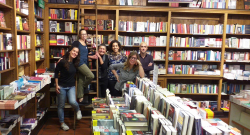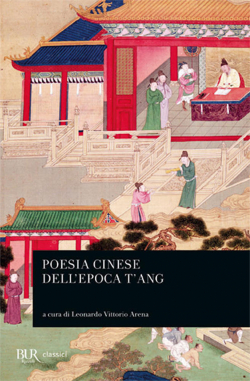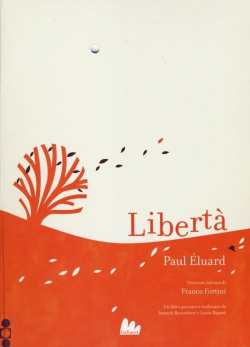THE END. THE BEGINNING.
by Alessandro Silva
Then. On the sanctified seventh day he laid down
his Hand. It rained and light craved for the season
it was losing. A bee was already in the cold
afraid of being dead.
Outdoor the strolls of the sick (and of the last
youths with bare arms) beside the flowerbed
encrusted with water, on the cobblestones. The fountain, all
soul and bone. Everybody still clinging to noises.
Then. On the seventh day, troubled by not having
anything anymore, he became bewilderment for those trifles
asking for affection and the giving up of the slimming down
of breath. He crushed them, in a red drop.
Red, the fear of little soul. Equating death.
Alessandro Silva
THE BOOKSHELF OF POETRY AT THE LIBRERIA FIACCADORI DI PARMA
by Francesca Del Moro
Located in the old town of Parma a few steps from the Cathedral and the Baptistery, the Fiaccadori bookshop was founded in 1829 by printmaker and publisher Pietro Fiaccadori, who rented some rooms inside the Bishop’s palace. Until the late 1990s, it was also a publishing house focusing on poetry, local history and religion. Now, Fiaccadori is a bookshop with a vast range of books on miscellaneous subjects, including religious books, children’s literature, illustrated books, essays, fiction and poetry collections. The bookshop frequently organizes presentations of non-fiction and fiction books and every month hosts the meetings of the ‘Malamud’ reading club which are attended by its most loyal customers. The bookshop also holds monthly meetings about poetry.
Libreria Fiaccadori – Via al Duomo 8/a - Parma – Tel: 0521 282445
facebook.com/libreria.fiaccadori
POESIA CINESE DELL’EPOCA T’ANG
by L. V. Arena
Among pleasant words a polite rest,
we enjoy the wine, the good one, moved.
We sing the songs of breezes and pines;
at the end of the sounds, stars sparse on the river.
I have a hangover... but you seem even more cheerful!
Intoxicated with joy, we will forget ourselves.
This anthology, edited by Leonardo Vittorio Arena, leads us to the discovery of the poetic production of the times of the T’Ang dynasty (618-907), the golden age of Chinese poetry and painting, comparable to Western Renaissance. The book includes 140 poems by 39 poets, dealing with love and friendship, nature and art, military life and war. The author of the lines quoted above, Li Po, lived between 701 and 762 and was perhaps the greatest Chinese poet. An unconventional and cheerful spirit, he gained official recognition thanks to his unquestionable talent. He can certainly be defined a Taoist, due to the importance he ascribed to spontaneity and a simple life.
POESIA CINESE DELL’EPOCA T’ANG
a cura di L. V. Arena
Meridiani Mondadori 2019
LIBERTÀ
by Paul Éluard
On health returned
On danger disappeared
On hope without memory
I write your name
And by the power of a word
I start my life again
I was born to know you
To name you
Freedom.
In 1942, French surrealist poet Paul Éluard clandestinely collaborated with the Resistance movement with books, articles and poems against Nazism. He wrote the beautiful poem “Freedom”, which was dropped in thousands of copies over occupied France by Allied planes. Éluard’s lines were translated into Italian by the poet Franco Fortini and published by Gallucci Editore in a highly refined accordion book, illustrated by Anouck Boisrobert and Louis Rigaud. The book was awarded the 2014 Andersen prize in the category “Best book made artfully”.
LIBERTÀ
Paul Éluard
Gallucci, 2013



